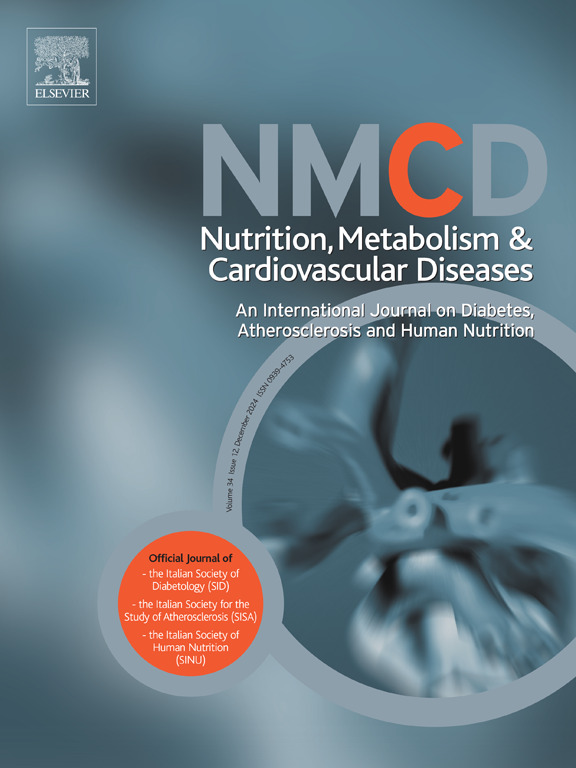高尿酸血症,一种新的心血管风险。
IF 3.3
3区 医学
Q2 CARDIAC & CARDIOVASCULAR SYSTEMS
Nutrition Metabolism and Cardiovascular Diseases
Pub Date : 2025-03-01
DOI:10.1016/j.numecd.2024.103796
引用次数: 0
摘要
背景和目的:高尿酸血症与心血管风险增加密切相关,包括高血压、冠状动脉疾病、心律失常和心力衰竭。尿酸作为嘌呤代谢的最终产物,在细胞过程中起着关键作用,但尿酸水平升高会引发炎症和氧化应激。本综述旨在强调高尿酸血症与心血管疾病之间的紧密联系,探讨降尿酸疗法是否可以减轻心血管事件并改善患者预后。方法和结果:对PubMed资料进行了全面回顾,强调了高尿酸水平与心血管事件之间的显著联系,特别是在痛风患者中。性别差异被观察到,绝经前妇女的尿酸水平较低,可能是由于激素的影响,这表明在评估心血管风险时可能需要针对性别的定义。流行病学研究表明,高尿酸血症与不良心血管结局之间存在一致的相关性。然而,使用黄嘌呤氧化酶抑制剂(如别嘌呤醇和非布司他)的介入性试验显示,它们对减少心血管事件的影响有不同的结果。此外,新出现的证据表明,停止这些治疗后出现“黄嘌呤氧化酶戒断综合征”,强调需要谨慎管理。结论:尿酸水平升高与心血管疾病之间的密切联系是有据可查的。虽然降低尿酸显示出降低心血管风险的潜力,但目前来自介入性试验的证据仍不确定。未来的研究应侧重于患者特异性治疗策略,特别是对于那些心血管风险高的高尿酸血症和/或痛风患者,以更好地确定靶向治疗的益处。本文章由计算机程序翻译,如有差异,请以英文原文为准。
Hyperuricemia, A new cardiovascular risk
Background and aims
Hyperuricemia is strongly linked to increased cardiovascular risk, including hypertension, coronary artery disease, arrythmia, and heart failure. Uric acid, as the end-product of purine metabolism, plays a critical role in cellular processes, but elevated levels can drive inflammation and oxidative stress. This review aims to emphasize the robust association between hyperuricemia and cardiovascular diseases, exploring whether uric acid-lowering therapies can mitigate cardiovascular events and improve patient outcomes.
Methods and results
A comprehensive review of PubMed sources was conducted, underscoring the significant link between high uric acid levels and cardiovascular events, particularly in patients with gout. Gender differences were observed, where premenopausal women have lower uric acid levels, likely due to hormonal effects, suggesting the potential need for gender-specific definitions in assessing cardiovascular risk. Epidemiological studies demonstrate a consistent correlation between hyperuricemia and adverse cardiovascular outcomes. However, interventional trials using xanthine oxidase inhibitors, such as allopurinol and febuxostat, have shown mixed results regarding their impact on reducing cardiovascular events. Additionally, emerging evidence suggests a "xanthine oxidase withdrawal syndrome" upon discontinuation of these therapies, highlighting the need for cautious management.
Conclusion
The strong association between elevated uric acid levels and cardiovascular diseases is well-documented. While lowering uric acid shows potential for reducing cardiovascular risk, current evidence from interventional trials remains inconclusive. Future research should focus on patient-specific therapeutic strategies, particularly for those at high cardiovascular risk with hyperuricemia and/or gout, to better define the benefits of targeted treatments.
求助全文
通过发布文献求助,成功后即可免费获取论文全文。
去求助
来源期刊
CiteScore
6.80
自引率
2.60%
发文量
332
审稿时长
57 days
期刊介绍:
Nutrition, Metabolism & Cardiovascular Diseases is a forum designed to focus on the powerful interplay between nutritional and metabolic alterations, and cardiovascular disorders. It aims to be a highly qualified tool to help refine strategies against the nutrition-related epidemics of metabolic and cardiovascular diseases. By presenting original clinical and experimental findings, it introduces readers and authors into a rapidly developing area of clinical and preventive medicine, including also vascular biology. Of particular concern are the origins, the mechanisms and the means to prevent and control diabetes, atherosclerosis, hypertension, and other nutrition-related diseases.

 求助内容:
求助内容: 应助结果提醒方式:
应助结果提醒方式:


